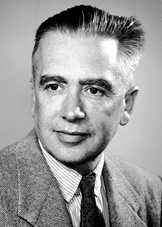Emilio Segrè (1905-1989) was an Italian physicist and winner of the 1959 Nobel Prize in Physics.
Segrè was recruited to join the Manhattan Project in late 1942 by J. Robert Oppenheimer. For security reasons, his cover name while on the project was Earl Seaman. Segrè became head of the P-5 (Radioactivity) Group, part of P Division, at the Los Alamos laboratory. His team began measuring the radioactivity of various fission products and analyzed information coming in from other sites, including Oak Ridge, Hanford, University of California, Berkeley, and Columbia University laboratories. Segrè’s group was also tasked with determining the degree of isotope enrichment achieved with various samples of enriched uranium. In 1945 he was assigned to measure gamma radiation from the Trinity Test site.
After the war, Segre returned to Berkeley briefly, before leaving for a position at the University of Illinois at Urbana-Champaign. In 1953 Segrè, along with Joseph Kennedy, Glenn Seaborg, and Arthur Wahl won a settlement for patents from pre-World War II discoveries; they each ended up with $120,000.
Segrè returned to Berkeley in 1952 and began searching for antiprotons. He was awarded the Nobel Prize in Physics in 1959 along with Owen Chamberlain for discovering conclusive evidence of antiprotons.





